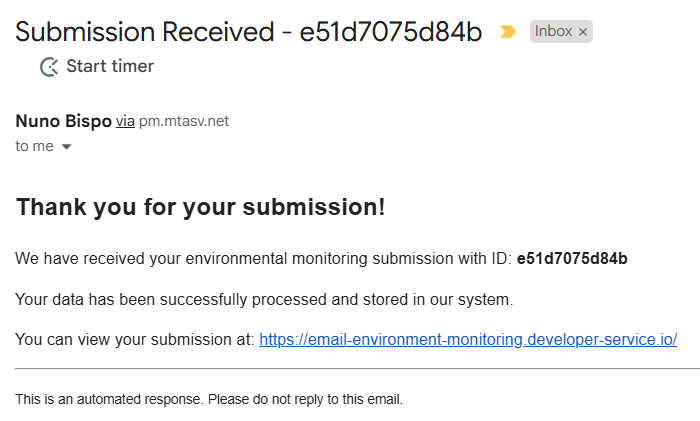This is a submission for the Postmark Challenge: Inbox Innovators.
What I Built
I built an Email-Driven Environmental Monitoring System that enables users to submit environmental data by simply sending an email.
The system leverages Postmark's inbound email parsing to turn emails into structured submissions, which are then processed, stored, and visualized through a modern web interface.
This tool is ideal for field researchers, citizen scientists, or community responders working in low-connectivity or dashboard-free environments.
By using email—a ubiquitous and lightweight interface—the system enables seamless submission of air quality readings, wildlife sightings, or geotagged photos.
Key functionality includes:
- Extracting GPS metadata from image attachments
- Assigning priority levels from inbox addresses
- Auto-sending confirmation emails with unique submission IDs
- A searchable, filterable interface to view all past submissions
Demo
You can access a live version at: https://email-environment-monitoring.developer-service.io/
Feel free to explore it and send emails to dev.to@developer-service.io with an optional hash for priority to add a new entry to the list.
For example:
- High priority:
dev.to+high@developer-service.io - Medium priority:
dev.to+medium@developer-service.io - Low priority:
dev.to+low@developer-service.ioor justdev.to@developer-service.io(default is low priority)
Fill in the subject of the situation to report, and the body of the email explains the situation.
You can (optionally) send images (inline or attachments) to document the situation. If the images have geotags, then the location will be recorded.
Let's see an email example:
Subject: Turkey
Body: Good weather in Turkey
Image:
Results in the following entry:

And the submitter will receive an email:

After a couple of submissions, the application looks like this:
Note: At the time of publishing this article, I have already used almost 50% of my 100 free emails quota at Postmark, so hopefully still have a couple of emails left for testing.
Code Repository
The full source code is available at GitHub Repository - EmailEnvironmentalMonitoring-Postmark.
Feel free to fork it and expand it, or reuse it for other purposes.
Instructions to run it locally are available in the README file.
How I Built It
The system is powered by a FastAPI backend (and frontend) and Postmark's inbound parsing engine.
It also uses Postmark for outbound transactional emails, notifying the recipients of the email submissions.
🧠 Architecture & Flow
The architecture was designed to be simple, with minimal code to show not only the burden of coding that Postmark relieves the developers, but also to show how simple an integration with Postmark is.
📬 Email Pipeline
The email processing pipeline of the application works as follows:
- User sends an email with a subject, body, and optional attachments
- Postmark parses the email and sends it as a JSON payload to
/webhook - FastAPI validates and stores email contents + attachments
- If images contain geotags, they're extracted and saved
- A confirmation email is sent back using Postmark’s outbound API
🧰 Tech Stack
The tech stack is simple, with proven libraries and frameworks:
- FastAPI: Lightweight, async Python framework for routing and validation
- SQLite: Embedded database for easy setup and portability
- Postmark: Handles all inbound email parsing and outbound confirmations
- Pillow + ExifTool: Extracts GPS metadata from images
- Jinja2: Frontend rendering and interactivity
📊 UI Experience
Even with a backend framework like FastAPI, which is designed for APIs, it is possible to build a powerful UI thanks to Jinja2 templates and a bit of Bootstrap5:
- Submissions are displayed in a card layout.
- You can search by subject, sender, or filter by priority
🤝 Why Postmark?
Postmark streamlined the entire process of handling inbound emails, allowing me to focus on the goal of this project: interpreting data and building meaningful user workflows.
Instead of wrestling with complex MIME parsing, multipart payloads, or SMTP quirks, Postmark delivers a clean, structured JSON payload directly to a webhook.
That alone saves hours of boilerplate code and debugging time.
Postmark also handled:
- Spam filtering & security: Ensuring only legitimate emails reach the system.
- Attachment parsing: Cleanly separating text content from images and other files.
- Reliability & Speed: Webhooks were delivered almost instantly with consistent formatting.
- Simple configuration: Setting up an inbound server and pointing it to my FastAPI endpoint was intuitive and quick.
Because of Postmark’s developer-first approach and robust documentation, I was able to rapidly prototype and iterate on the email-to-data pipeline without worrying about infrastructure-level email handling.
It changed what could have been a deeply technical bottleneck into a smooth, reliable integration that felt more like plugging in a service than building one from scratch.
This project also shows how email can become a low-friction, high-utility data input method—perfect for grassroots environmental action and decentralized field reporting.
Thanks for reading—and thanks to Postmark for such a great developer experience!





Top comments (2)
awesome work! 🔥
Thanks